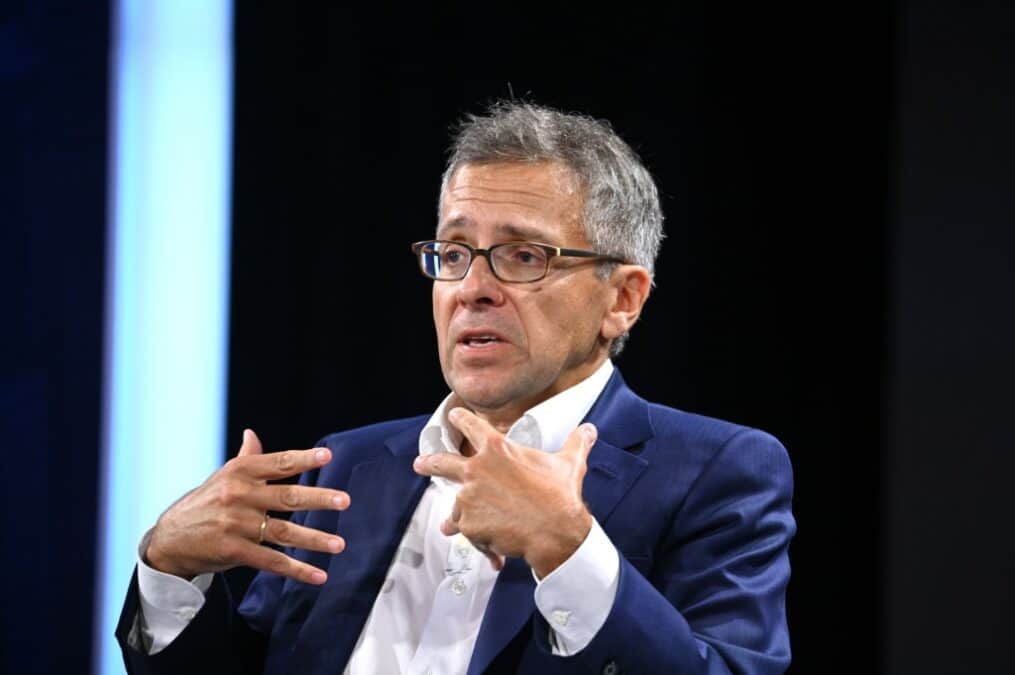DAVOS, SWITZERLAND — The war will not end anytime soon, and Russia is in a hot war with the West, which is causing the country’s economy to deteriorate and political isolation to increase, Ian Bremmer, Founder and President at Eurasia Group, told TRENDS during an exclusive interview.
Bremmer raised concerns about the state of global leadership and the potential risks posed by rogue actors in both corporate and geopolitical environments.
He pointed to the ongoing conflict between Ukraine and Russia as an example of a powerful global leader, Russian President Vladimir Putin, making catastrophic mistakes due to inadequate information and lack of checks and balances.
Bremmer also expressed concern that Xi Jinping may be headed in a similar direction with his advisors not providing accurate information, as evidenced by China’s flawed execution of the Zero-COVID policy. The rise of such rogue actors outside of traditional market and geopolitical environments is creating uncertainty and risk in 2023.
Talking about the region, Bremmer said that Iran is the most powerful rogue actor in the Middle East. While the Middle East is looking more inward and consolidating, Iran’s increasing threat to the region is due to being cut off from the rest of the world economy and performing badly.
Bremmer raised his concerns about Russia’s increasing opposition to the West and creating an air force for Iran. He suggested that the US role in the Middle East is stabilizing but diminishing, as the US is currently focused on its competitive environment with China and its relationships with allies in Asia.
Exerpts
How do you see the world right now with ongoing war in Ukraine and the deepening US-China conflict?
You have a small number of individuals with an enormous amount of power on the global stage who are surrounded by people that are incredibly loyal to them but don’t necessarily have good information or don’t give good information, and therefore they can make big mistakes.
That’s most clearly true with Putin. He has made the single biggest mistake of any major leader on the geopolitical stage, because he had horrible information and no cheques and balances internally. He didn’t know what his military was going to be capable of doing, didn’t know what will Ukrainians do, didn’t know how the West would react, didn’t know how China wouldn’t support him and so now we’re in this horrible position because you had a very powerful global leader doing incredibly stupid things.

My concern is that Xi Jinping may increasingly be in that direction – not to become a rogue state – but as we’ve seen with Zero-COVID policy he now has loyalists around him who are not giving him right information. Instead they are just saying “yes you’re right about everything.” That means when they made a decision to move on from Zero-Covid policy, everyone gets Covid. This means they didn’t execute it well. Well, one thing we know about China is they execute well, you may not like their policies but they actually implement, but that’s not been true over the last months at all.
That doesn’t happen only with global leaders but also with corporate leaders. We see that with Mark Zuckerberg, Elon Musk; some of the most powerful individuals on the planet who run their institutions with virtually no checks and balances internally and also frequently don’t have good information about the implications of what they’re going to do.
I think that these sort of rogue actors that are outside of the traditional market and geopolitical environment are creating much more uncertainty and risk in 2023.
How do you see Russia-Ukraine conflict ending?
This is a new environment. Keep in mind that the Russians invaded Ukraine in 2014, so this war has been going on for nine years. No one in Davos was talking about it until February 24, 2022 but the Russians and Ukrainians were actively fighting.
There’s no reason to believe it’s going to end soon. The bigger issue is that the Russians are now in a hot war with the West and they’re performing very badly. Their economy is deteriorating, they are politically isolated, NATO is expanding, G7 is stronger and NATO is stronger. So how does Russia possibly get itself out of this mess and the answer to this is ‘no way’.
Putin is becoming the most powerful rogue actor on the global stage in a way that Iran is the most powerful rogue actor in the Middle East. The Middle East for example is looking more inward but it’s consolidating. It is coming together. You see much better relations between the UAE and Qatar and Saudi Arabia and all the countries in the region except Iran.
Iran is increasingly a threat to all of these countries because they’re cut off from the rest of the world economy and they’re performing badly.
Who’s Iran’s best friend?
Russia is creating an Airforce for Iran. Russia is increasingly in opposition so I worry about that.
How do you see the US role in the Middle East?
US role in the Middle East, on balance, is stabilising but diminishing. I think that there are other priorities that Americans are focusing on right now: It’s the competitive environment with China and relationship with America’s allies in Asia.
The hot war by proxy going on with Russia and the alignments that we have with Europe, those are occupying 90 percent of strategic thinking in the US right now.

